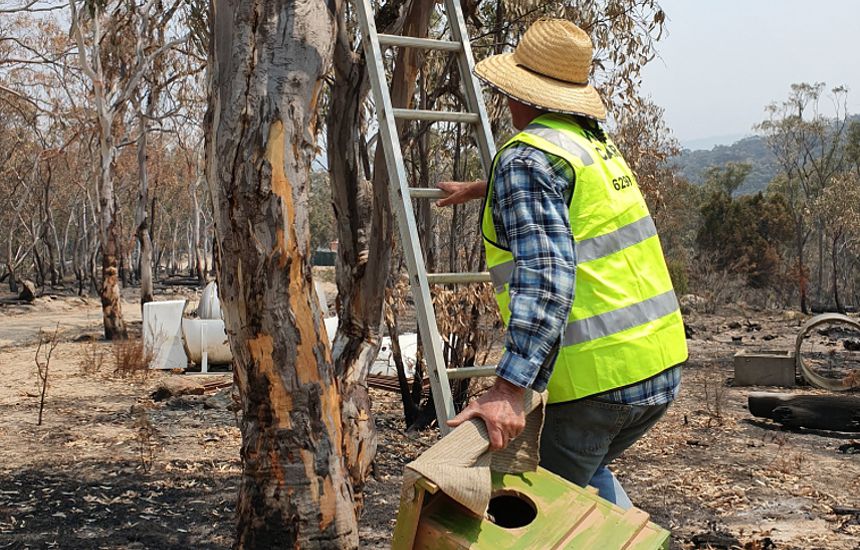
SINCE CHRISTMAS, WILDCARE, with the help of many affected property owners, and community volunteers, such as the Southern Tablelands 4WD Club, have been delivering essential food — grass, hay, pellets, bird seed, fruit/vegetables and ‘browse’ (native tree and shrub cuttings) — to known surviving animals, whose habitat has been destroyed.
More than 40 food stations were positioned at strategic locations in and around the Tallaganda bushfire area, and in Michelago. These are being regularly replenished. Nesting boxes for possums and gliders have also been erected to provide shelter. It might appear that Wildcare is scratching the surface, but every animal saved will provide the nucleus to rejuvenate these areas in years to come. A Wildcare member’s wildlife sanctuary, destroyed by bushfire on 23 January, has used a koala-detection dog to seek out animals needing rescue.
CAPTION: Peter, from Wildcare, installs a possum box.
Wildcare has received some cash donations (they are always useful!) and has also been supported by the World Wildlife Fund. Local businesses have been tremendous with their donations of food and equipment. Hay continues to be available to support grass-eating native animals (to obtain hay contact haydrop@wildcare.com.au).
On a weekly basis, Wildcare gathers native ‘browse’ (wattle, acacia, bottle brush, grevillea, flowers, new shoots etc) and fruit/vegetables. If you want to help please email haydrop@wildcare.com.au and find out what is needed and when.
If you need local help and advice on wildlife issues, get in touch on Wildcare’s helpline 6299 1966 (put it in your Mobile phone) or via wildcare.com.au.
No areas of society are immune to the impact of COVID-19. Wildcare’s training program for current and new volunteers has also become a casualty with recently announced macropod and bird training courses being postponed. Indeed, all group training has been abandoned, until at least July. This does not mean Wildcare is shutting up shop — far from it. Providing a service to the community, in rescuing and rehabilitating injured and orphaned animals, is paramount and continues — albeit volunteers have to observe the government-directed social isolation rules, around people, just like anyone else.
— Phillip Machin, Queanbeyan Wildcare, NSW